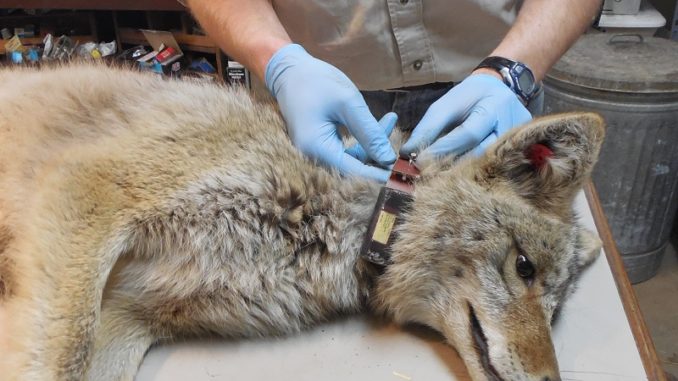
Hours of discussion at the Culver City Council meeting of February 11, 2019 led to a four to one vote to approve a study and management program on coyotes. The $211,000 contract, agreed upon but not yet finalized in anticipation of a community meeting that will give more opportunities for input from residents, will connect the city with Loyola Marymount University in three years of research and strategizing for animal control and human education.
Mayor Thomas Small moved the item forward on the agenda to accommodate the many people who had come to speak from the podium, and began with the staff report. CCPD Lt. Chris Lopez noted the adoption of the now-standing coyote management plan from January of 2016, and said that “trapping [was] only to be considered when public safety is at risk.”
Dr. Eric Strauss, of Loyola Marymount University, is the urban wildlife specialist being considered for the contract. He has a-“25 year history of doing coyotes studies in New England, managing animals in the urban context.” Local studies have included Long Beach and Silver Lake coyote issues. His enthusiasm for working in Culver City included the “proximity to the university – [that] makes it easy to bring students and staff, we have 25 to 50 undergrads in the program every year.”
Strauss spoke at length about “fragmented habitats and the effect of human activity” and the need to see all the factors, both human and animal, as interrelated and interdependent.
“When you look closely at the choices coyotes make, a small percentage of their diet is cats,” Strauss offered, “cats change their behavior when coyotes are present, and that is good news for birds. An increase in birds becomes a decrease in insects, as the birds eat them. Properly managed, the ecosystem is balanced.”
His proposed study will include working with CCUSD to develop a curriculum to teach children and their parents how to live with coyotes – a population that is not going away.
The speakers from the podium took great exception to the idea that cats were only a small part of the coyote diet.
Gail Harris was non-plussed when she said, ” What I don’t get is what the purpose of this study is. I can understand why researching them is really interesting to you, but what I don’t understand is what we get out of this. For $65,000 for documentation – we did all that for you for free [in the data collected last summer] I’m sure there’s value in these studies I just don’t see how it benefits us.”
Susan Tillerson said that she felt notification was lacking. “I only found out about this a day or two ago. I don’t know why we were not invited to participate. I don’t understand why all this is about collecting data, what is that going to change? What about all the data we collected last summer?”
The summer of 2018 was when more than 60 cats were eaten by coyotes in a month in Carlson Park, provoking an outcry from the residents that the coyote management plan was not working.
Linda Lockhard questioned why there was only one proposal being considered.
“The more than 60 cats killed in less than a square mile,” noted Jo Stone “do not seem like a small part of the coyote diet. If we the residents are paying for it, why are we not allowed input on this?”
Lila Swenson, who lost three cats to the coyotes last summer, said, ” I’m trying to participate in a way that is productive. When I first looked at this study, I was excited. There can be community benefits here with the right level of communication.”
Rich Kissel and Paul Ehrlich both objected to the cost, noting that the city had other things to budget for.
When it was the council’s moment to speak, there were a number of points considered, but the time frame proved to be the most urgent issue. With spring – and coyote’s mating and birthing season right around the corner, the motion was made by Sahli-Wells and seconded by Lee to approve the proposal. The city staff will create the contract, and there will be another community meeting before all is finalized.
Eriksson was the only dissenting vote.
Dr. Strauss was open to community member participation in the research and management program, and offered to discuss how residents could coordinate with the data gathering and observation.
Judith Martin-Straw


Be the first to comment